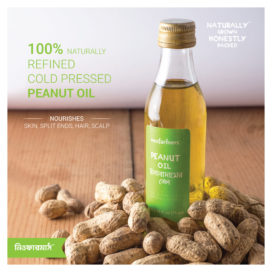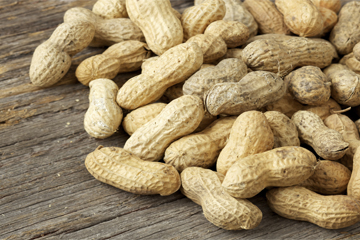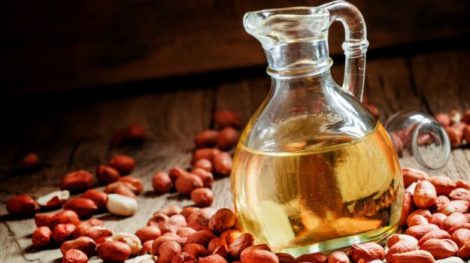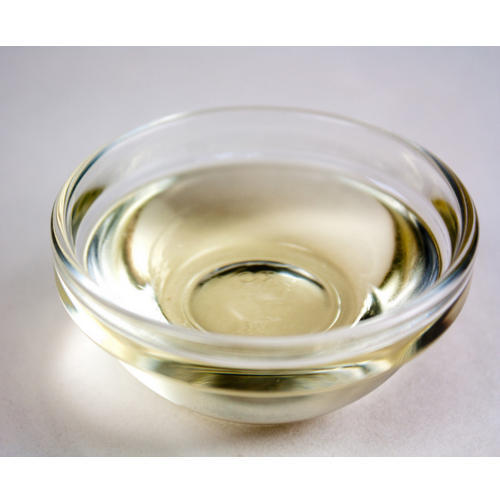- You have no items in your shopping cart
- Subtotal: 0.00৳
It is a vegetable oil that is naturally trans fat-free, cholesterol free, and low in saturated fats. Peanut oil is high in unsaturated fats, especially monounsaturated fat, like the one found in olive oil. It is also a source of the antioxidant vitamin E and phytosterols, which benefit heart health. Peanut oil is a popular oil that is commonly used in cooking, especially when frying foods.
Peanut oil, also referred to as groundnut oil or arachis oil, is a vegetable-derived oil made from the edible seeds of the peanut plant. Though the peanut plant flowers above ground, the seeds or peanuts actually develop underground. This is why peanuts are also known as groundnuts.
Peanuts are often grouped with tree nuts like walnuts and almonds, but they are actually a type of legume that belongs to the pea and bean family.
Depending on processing, peanut oil can have a wide range of flavors that vary from mild and sweet to strong and nutty.
There are several different types of peanut oil. Each one is made using different techniques:
- Refined peanut oil: This type is refined, bleached and deodorized, which removes the allergenic parts of the oil. It is typically safe for those with peanut allergies. It is commonly used by restaurants to fry foods like chicken and french fries.
- Cold-pressed peanut oil: In this method, peanuts are crushed to force out the oil. This low-heat process retains much of the natural peanut flavor and more nutrients than refining does.

- Gourmet peanut oil: Considered a specialty oil, this type is unrefined and usually roasted, giving the oil a deeper, more intense flavor than refined oil. It is used to give a strong, nutty flavor to dishes like stir-fries.
Peanut oil is widely used around the world but is most common in Chinese, South Asian and Southeast Asian cooking. It became more popular in the United States during World War II when other oils were scarce due to food shortages.
It has a high smoke point of 437℉ (225℃) and is commonly used to fry foods. And it can be used on hair and skin too!
Health Benefits
Here is the nutritional breakdown for one tablespoon of peanut oil
- Calories: 119
- Fat: 14 grams
- Saturated fat: 2.3 grams
- Monounsaturated fat: 6.2 grams
- Polyunsaturated fat: 4.3 grams
- Vitamin E: 11% of the RDI
- Phytosterols: 27.9 mg

– Peanut oil is high in monounsaturated fat, making it a popular choice for high-heat cooking.
– It is a good source of vitamin E, which has many health benefits, including reducing certain risk factors for heart disease and lowering blood sugar levels in people with diabetes.
-As peanut oil contains Omega 6 , High intakes of omega-6 fats to an increased risk of breast cancer in women
– Peanut oil is sometimes applied directly to the skin for arthritis, joint pain, dry skin, eczema, and other skin conditions. But there is limited scientific evidence to support these uses.
– Lowering cholesterol.
-Decreasing appetite for weight loss.
-Constipation, when applied to the rectum.
-It Boosts Immune System like Viral and fungal infections are particularly susceptible to this antioxidant, so adding peanut oil to your diet can keep you healthy in yet another way, by stimulating your white blood cell production to fend off any foreign agents in your body.
Skin Care
Peanut oil, like many vegetable oils, is quite rich in vitamin E, which is an essential vitamin for human beings. It is particularly important for the maintenance and health of the skin, protecting it from the effects of free radicals that cause wrinkles, blemishes, and other signs of premature aging. The vitamin E in peanut oil keeps your skin looking young and healthy as you get older. Massage it every night on your skin and wash away and see the glow!
Hair Care
Peanut oil reduces protein loss, thickens the hair, adds moisture to split ends and regenerates damaged hair. It also reduces flaking of the scalp. You can use peanut oil as a hot oil treatment, which is excellent for dry, dull, brittle, damaged hair, or you can add it to your deep conditioning treatments as well. This oil is on the thick side, so if your DIY: Deep Conditioner seem to be too runny this oil, as well as a little bit more conditioner or your conditioning base, will help thicken it up.

Disadvantages
It is very high in pro-inflammatory omega-6 fatty acids and is prone to oxidation, which may increase the risk of certain diseases

